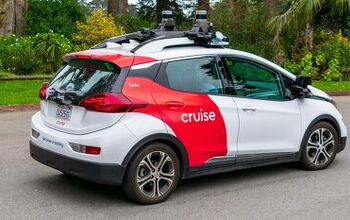Volkswagen, Suzuki, SAIC In Three-Way Talks

We’ve always suspected that there’s something bigger driving the (well..) tie-up between Volkswagen and Suzuki than little cars: Big markets. Volkswagen holds the keys to China, where they rule the roost, whatever numbers GM may conjure-up. Suzuki is nobody in China. Suzuki holds the keys to India. Volkswagen is nobody in India. It’s the perfect marriage. Even more perfect with some Chinese help ….
Short-term, Suzuki has more to gain, which is always nice when you romance a new bride. Volkswagen sold nearly a million cars in China in the first six months. By 2013/2014, they want to sell three million cars a year in China, not a pipe dream at all.
The whole Indian market amounted to 1.43m units last year, but Maruti-Suzuki owns more than half of that – not a bad dowry at all. Suzuki knows that they will not be able to hold that dominant market share over the long term, a lesson Volkswagen had to learn in China. VW once owned half of the Chinese market. They had to give up share as other players entered. But it’s easier to give up a little share in a growing market and make it up with volume than fight the uphill battle of the latecomers. Also, in the long run, a more mature Indian market will need a player that can serve all segments.
What’s more, Suzuki can use a little moxie: Suzuki just announced that Maruiti-Suzuki’s net profit shrank for the first time in five quarters in the April-June period, down 20 percent year on year, as The Nikkei [sub] heard.
We had our suspicions that Volkswagen would throw Suzuki a piece of their Chinese pie in exchange for Indian favors. And so it happens. Suzuki Motor is in talks with Volkswagen and their Chinese joint venture partner SAIC to set up a three-way joint venture in China “on the basis of the Shanghai Volkswagen Co”, says Gasgoo. Their source? “A top executive from Suzuki’s Chinese partner, Changan Auto.” Of course they would rat on their Japanese bride if she has a fling with two other guys.
There have been other suspicious moves. In March, Suzuki China relocated its 15-year-old office in Beijing to Shanghai’s Anting town, a stone throw away from SAIC and Shanghai Volkswagen. That happened right after Volkswagen announced that it would pay $2.5b for a 19.9 percent stake in Suzuki.
As for the rest, no reason to speculate. A similar announcement from India is probably not too far away. It wouldn’t surprise us if SAIC will play some part in that also. The Chinese have their eyes on the Indian market, but they need partners to get in, as demonstrated with the GM-SAIC India deal. Except that a Suzuki-Volkswagen deal could be much bigger than selling a few vans to the Indians.
Well, a Japanese-Chinese-German liaison should get interesting. Especially, when they all show up in India.

Bertel Schmitt comes back to journalism after taking a 35 year break in advertising and marketing. He ran and owned advertising agencies in Duesseldorf, Germany, and New York City. Volkswagen A.G. was Bertel's most important corporate account. Schmitt's advertising and marketing career touched many corners of the industry with a special focus on automotive products and services. Since 2004, he lives in Japan and China with his wife <a href="http://www.tomokoandbertel.com"> Tomoko </a>. Bertel Schmitt is a founding board member of the <a href="http://www.offshoresuperseries.com"> Offshore Super Series </a>, an American offshore powerboat racing organization. He is co-owner of the racing team Typhoon.
More by Bertel Schmitt
Latest Car Reviews
Read moreLatest Product Reviews
Read moreRecent Comments
- Honda1 Unions were needed back in the early days, not needed know. There are plenty of rules and regulations and government agencies that keep companies in line. It's just a money grad and nothing more. Fain is a punk!
- 1995 SC If the necessary number of employees vote to unionize then yes, they should be unionized. That's how it works.
- Sobhuza Trooper That Dave Thomas fella sounds like the kind of twit who is oh-so-quick to tell us how easy and fun the bus is for any and all of your personal transportation needs. The time to get to and from the bus stop is never a concern. The time waiting for the bus is never a concern. The time waiting for a connection (if there is one) is never a concern. The weather is never a concern. Whatever you might be carrying or intend to purchase is never a concern. Nope, Boo Cars! Yeah Buses! Buses rule!Needless to say, these twits don't actual take the damn bus.
- MaintenanceCosts Nobody here seems to acknowledge that there are multiple use cases for cars.Some people spend all their time driving all over the country and need every mile and minute of time savings. ICE cars are better for them right now.Some people only drive locally and fly when they travel. For them, there's probably a range number that works, and they don't really need more. For the uses for which we use our EV, that would be around 150 miles. The other thing about a low range requirement is it can make 120V charging viable. If you don't drive more than an average of about 40 miles/day, you can probably get enough electrons through a wall outlet. We spent over two years charging our Bolt only through 120V, while our house was getting rebuilt, and never had an issue.Those are extremes. There are all sorts of use cases in between, which probably represent the majority of drivers. For some users, what's needed is more range. But I think for most users, what's needed is better charging. Retrofit apartment garages like Tim's with 240V outlets at every spot. Install more L3 chargers in supermarket parking lots and alongside gas stations. Make chargers that work like Tesla Superchargers as ubiquitous as gas stations, and EV charging will not be an issue for most users.
- MaintenanceCosts I don't have an opinion on whether any one plant unionizing is the right answer, but the employees sure need to have the right to organize. Unions or the credible threat of unionization are the only thing, history has proven, that can keep employers honest. Without it, we've seen over and over, the employers have complete power over the workers and feel free to exploit the workers however they see fit. (And don't tell me "oh, the workers can just leave" - in an oligopolistic industry, working conditions quickly converge, and there's not another employer right around the corner.)































Comments
Join the conversation
I like Suzuki rather than a Volkswagen. Suzuki has more to gain. Suzuki knows that they will not be able to hold that dominant market share over the long term, a lesson Volkswagen had to learn in China. online car insurance quote